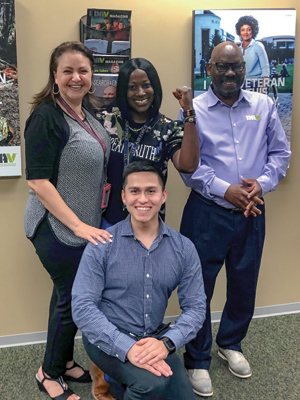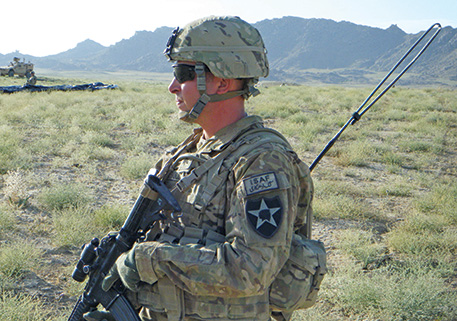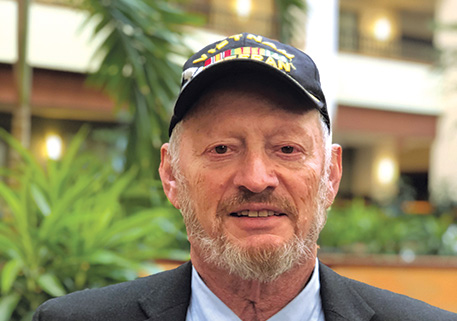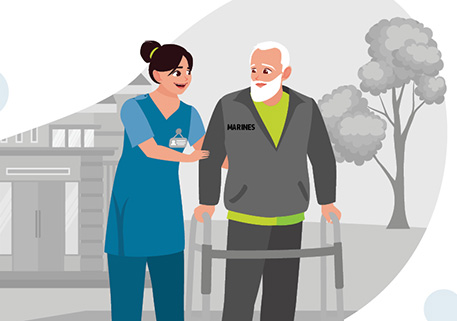
DAV helps connect Air Force veteran, survivor of domestic abuse and military sexual trauma, with VA compensation
Rhomauda Vercher was determined to make a career out of the Air Force, but after surviving domestic abuse and a sexual assault, she found herself in an unexpected situation: restarting life as a civilian after just two years.
“I endured two abusers throughout my time in the Air Force,” said Vercher. “One was my husband at the time, so that was difficult.”
Vercher joined the Air Force after graduating from high school in 1996 and was married shortly after. She reported to her first assignment at Nellis Air Force Base, Nev., where she began to see a troubling side of her new spouse.
He tried breaking into houses on base and became physically abusive toward Vercher.
“I was an exemplary airman, but this man made trouble for me from the very moment we made it to base,” she said. Eventually, her command moved her into the base dormitories to help keep her safe. “I was vulnerable and scared, so my first sergeant separated us.”
That’s when a fellow airman sexually assaulted her. Vercher was at the noncommissioned officer’s club on base with some girlfriends one evening when she was approached by a young man she knew. They talked a bit before she decided it was best to return to the dorms.
But much to her surprise, the man showed up, refusing to leave. After a brief exchange of words, the situation turned violent.
“He forced himself on me,” recalled Vercher. “I told him no, but he continued to force himself on and into me.”
She didn’t initially report the assault to her command out of intense shame and guilt, but she quickly fell into a spiral that eventually would lead to her ouster from the Air Force.
“I felt like I put myself there,” said Vercher. “With everything else going on with my husband, my first sergeant was not supportive.”
Vercher plunged into anxiety and depression, attempting to take her own life twice. Her mental health became so distressing that it began to impact her work.
In 1998, she parted ways with the Air Force and went to live with her grandmother back home in Louisiana. She said she felt like a broken woman.
“I was just shut down,” she recalled. “I was gone.”
Vercher ultimately divorced her husband and moved to Houston in 2003. But, followed by a cloud of shame, she rarely spoke about her military service.
“I tucked away everything from the Air Force into a box, literally,” she said.
The box would move with her, as did the trauma.
Vercher began filing a VA claim for post-traumatic stress disorder in 2007, but she was unfamiliar with the process and became frustrated that they went nowhere. Stigma and stress held her back personally and professionally, and on more than one occasion, she would travel to the VA medical center in Houston, sit in her car and cry before ultimately going back home. The idea of discussing her assault was too much to bear.
To make matters worse, she also suffered from debilitating migraines, anxiety, panic attacks and depression.
In 2012, a VA doctor she knew and trusted recommended the VA’s Women’s Inpatient Specialty Environment of Recovery (WISER) program, a three-month treatment option for women veterans seeking care related to PTSD, mood or anxiety disorders, substance abuse and other mental health conditions.
“They saved my life,” said Vercher. “I was dying slowly.”
She was diagnosed with PTSD due to military sexual trauma and was encouraged to submit a new disability claim. She opted to have DAV help her.
“I heard a lot of great things about DAV,” said Vercher. “I knew other veterans who had success through them.”
Armed with the confidence gained in treatment to submit a claim, she met with National Service Officer Judy Russell, the assistant supervisor for the Houston office, in June 2016.
“When she came to me, she discussed the assault, which was incredibly hard for her,” recalled Russell.
She explained what was needed to get the claim over the finish line.
“I always tell every veteran I see that there are three basic elements of any service connection,” said Russell. “You have to have an event that can be verified by VA somehow, you have to have a current diagnosis and a medical opinion that links the two together.”
“In the past, [Vercher] was missing that.”
In May 2018, Vercher obtained a medical opinion from a VA doctor. With years of evidence and medical documentation, she submitted a claim with the help of the entire Houston office.
“It was a real team effort,” said Russell.
In early 2019, Vercher received news that her claim had finally been approved.
“When we heard that, we cried,” Russell added.
Vercher, now a DAV member, said the fight was well worth it.






